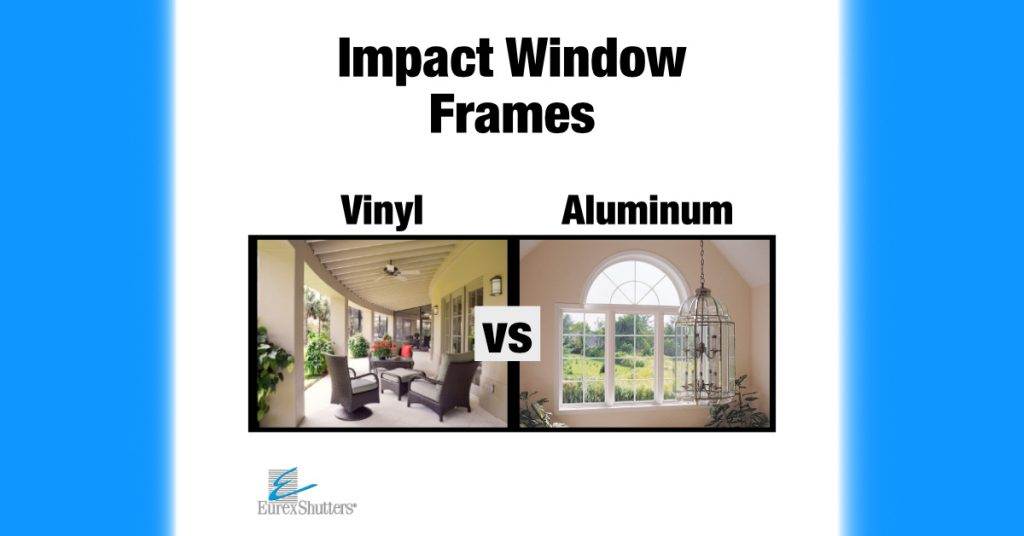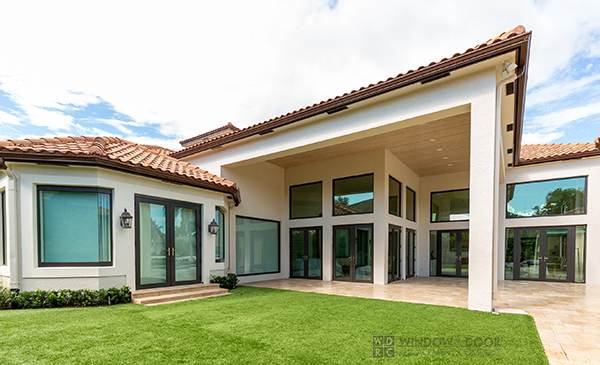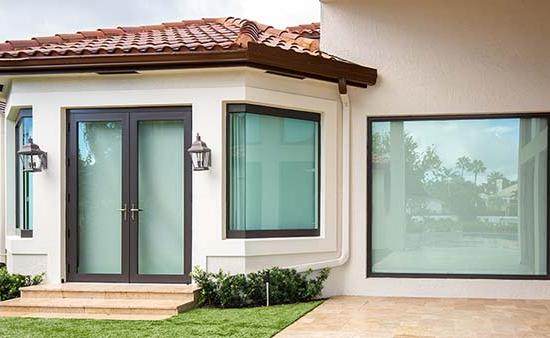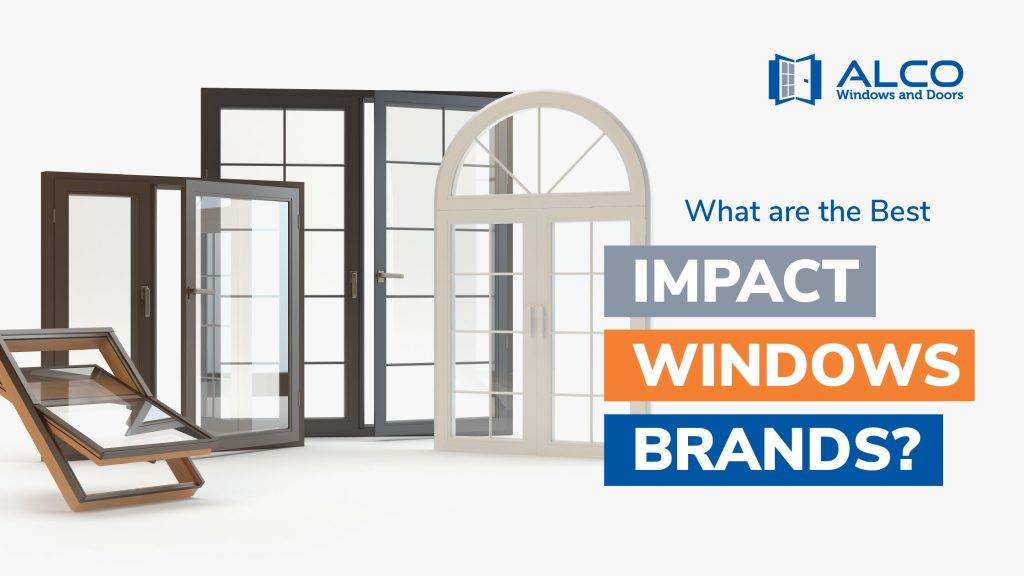In this article, we will discuss the different types of frames available for impact windows and which one is the most suitable. We will explore the pros and cons of each frame material, such as aluminum, vinyl, and wood. By the end of this article, you will have a clear understanding of which frame option is best for your impact windows, considering factors like durability, aesthetics, and energy efficiency. So, let’s dive in and find out which frame is the right choice for you!

This image is property of eurexshutters.com.
Introduction
Understanding the importance of impact windows
Impact windows are an essential investment for any homeowner living in areas prone to hurricanes, strong winds, or other extreme weather conditions. These windows are designed to withstand the impact of flying debris, ensuring the safety of your home and its occupants. But when it comes to choosing the right impact windows, one crucial decision to make is selecting the frame material. The frame not only provides structural support but also contributes to the overall performance and aesthetics of the window. In this article, we will explore the different frame options available for impact windows and discuss their pros and cons.
Why choosing the right frame is crucial
The frame material you choose for your impact windows plays a vital role in determining their durability, energy efficiency, and overall performance. Different frame materials offer various benefits and have unique characteristics that may suit your specific needs and preferences. It is important to consider factors such as strength, insulation properties, maintenance requirements, and architectural style compatibility when selecting the frame for your impact windows. By understanding the advantages and disadvantages of each frame material, you can make an informed decision that ensures the optimal performance and longevity of your impact windows.
1. Aluminum Frames
Pros and cons of aluminum frames
Aluminum frames are a popular choice for impact windows due to their strength, durability, and versatility. They offer exceptional resistance against corrosion and require minimal maintenance. However, aluminum frames have poorer insulation properties compared to other materials, making them less energy-efficient. Additionally, aluminum frames can be more expensive than other options.
Durability and strength of aluminum frames
Aluminum frames are known for their exceptional durability and strength. They can withstand heavy impacts and are resistant to corrosion, making them highly suitable for coastal areas or regions with high humidity levels. The durability of aluminum frames results in long-lasting windows that require minimal upkeep, making them a convenient choice for homeowners looking for low-maintenance windows.
Aesthetics and customization options
Aluminum frames offer a sleek and modern aesthetic that can complement various architectural styles. They are available in a wide range of finishes and colors, allowing homeowners to customize their windows to match their preferences and existing home decor. Aluminum frames also offer the option of larger glass surface areas, providing unobstructed views and maximizing natural light intake.
2. Vinyl Frames
Benefits of vinyl frames for impact windows
Vinyl frames are another popular choice for impact windows due to their affordability, energy efficiency, and low maintenance requirements. They offer excellent insulation properties, helping to keep your home comfortable and reducing energy costs. Vinyl frames are also resistant to rot, termites, and other pests, ensuring their longevity and durability.
Energy efficiency and insulation properties
Vinyl frames provide excellent insulation, reducing heat transfer and improving overall energy efficiency. Their insulation properties help to keep your home warmer in winter and cooler in summer, resulting in reduced energy consumption and lower utility bills. Vinyl frames also contribute to sound insulation, minimizing exterior noise infiltration, and creating a quieter and more peaceful indoor environment.
Low maintenance and long-lasting
One of the major advantages of vinyl frames is their low maintenance requirements. They do not require painting or sealing, and they are resistant to chipping, peeling, and fading. Unlike wood frames, vinyl frames do not warp or rot, ensuring their longevity and eliminating the need for regular repairs or replacements. With proper care and cleaning, vinyl frames can maintain their aesthetics and functionality for many years.
3. Fiberglass Frames
Advantages of fiberglass frames
Fiberglass frames are gaining popularity for impact windows due to their superior strength, durability, and resistance to various elements. They offer excellent thermal performance, are non-conductive, and are highly resistant to rot, corrosion, and pests. Fiberglass frames also require minimal maintenance and offer a wide range of customization options.
Superior strength and durability
Fiberglass frames are exceptionally strong, making them highly resistant to impacts and extreme weather conditions. They have a high strength-to-weight ratio, allowing for larger window sizes without compromising structural integrity. Fiberglass frames are also resistant to warping, expanding, or contracting with temperature changes, ensuring long-term durability and functionality.
Resistance to rot, corrosion, and pests
Unlike wood frames, fiberglass frames are impervious to rot, corrosion, and pest infestations. They are resistant to moisture damage, making them an ideal choice for humid or coastal areas. Fiberglass frames do not require painting or sealing, eliminating the risk of peeling or fading over time. These frames are also highly resistant to ultraviolet (UV) radiation, preventing the material from deteriorating or discoloring under prolonged sun exposure.

This image is property of images.contentstack.io.
4. Wood Frames
The appeal of wood frames for impact windows
Wood frames offer a classic and elegant look that can enhance the charm and character of any home. They are highly customizable, allowing for various design options and finishes. Wood frames also provide excellent insulation properties and contribute to energy efficiency.
Classic and elegant look
Wood frames are renowned for their timeless aesthetic appeal. They exude warmth and sophistication, adding a touch of elegance to any architectural style. Wood frames can be painted or stained to match your desired color scheme, providing endless design possibilities. The natural grain patterns of wood also create a unique and attractive appearance that cannot be replicated by synthetic materials.
Insulation and energy efficiency
Wood frames offer excellent insulation properties, helping to retain heat during the winter and keep your home cool in the summer. The natural insulating capabilities of wood can help reduce your energy consumption and lower your heating and cooling costs. Furthermore, wood frames contribute to sound insulation, minimizing noise transmission and creating a peaceful and comfortable indoor environment.
5. Composite Frames
Understanding composite frame materials
Composite frames are made from a combination of materials such as wood, PVC, and fiberglass. These frames offer the advantages of different materials while minimizing their drawbacks. Composite frames are highly durable and provide excellent thermal performance and resistance to various elements. They are also highly customizable and offer a wide range of design options.
Strength and durability of composite frames
Composite frames are designed to provide maximum strength and durability. The combination of different materials makes them highly resistant to impacts, weathering, and structural damage. Composite frames can withstand extreme temperatures without warping or expanding, ensuring their long-term reliability and functionality. They also offer exceptional resistance to rot, corrosion, and pests, making them suitable for various environments.
Versatility and customization options
Composite frames offer a high degree of versatility and customization options. They can be painted or stained to match any color scheme or architectural style, allowing you to achieve the desired aesthetic appeal for your impact windows. Composite frames also offer various style options, including different profiles, finishes, and textures, allowing you to create windows that suit your unique preferences and complement your home’s existing design.

This image is property of www.windowanddoorreplacementcompany.com.
6. Impact-Resistant Glass Options
Laminated glass for impact windows
Laminated glass is the most common type of glass used in impact windows. It consists of two or more layers of glass bonded together with a durable interlayer, typically made of polyvinyl butyral (PVB). Laminated glass is designed to withstand heavy impacts without shattering, ensuring the safety of your home and its occupants.
Benefits of laminated glass
Laminated glass offers numerous benefits for impact windows. It provides enhanced security by preventing forced entry, as it is difficult to break through the multiple layers of glass and interlayer. Laminated glass also offers excellent sound insulation, reducing exterior noise and creating a quieter indoor environment. Additionally, laminated glass filters out harmful UV rays, protecting your interiors from fading and preventing skin damage caused by prolonged sun exposure.
Other glass options for impact windows
Apart from laminated glass, there are other glass options available for impact windows. These include tempered glass, which is heat-treated to improve its strength and resistance to impacts, and insulated glass, which consists of multiple glass panes separated by an airspace filled with an insulating gas. These glass options can provide additional benefits such as improved thermal performance and sound insulation, depending on your specific requirements.
7. Factors to Consider When Choosing a Frame
Climate considerations
When selecting a frame for your impact windows, it is crucial to consider the climate of your region. Different frame materials have varying resistance to specific weather conditions. For example, fiberglass frames are highly resistant to extreme temperatures and humidity, making them suitable for coastal or humid areas. Wood frames, on the other hand, may require more maintenance and treatment in such environments.
Budget and affordability
Your budget is an important factor to consider when choosing a frame for your impact windows. Different frame materials have different price points, with vinyl frames usually being the most affordable option. However, it is essential to balance cost with durability, energy efficiency, and overall performance. Investing in higher-quality materials may save you money in the long run through reduced energy costs and maintenance requirements.
Aesthetics and architectural style
The frame material you choose should complement your home’s architectural style and aesthetic preferences. Aluminum frames offer a sleek and modern look, while wood frames provide a classic and elegant appeal. Consider the existing design and color scheme of your home, as well as any HOA restrictions, when selecting the frame material and finish.
Maintenance requirements
Different frame materials have varying maintenance requirements. Aluminum and vinyl frames typically require minimal upkeep, while wood frames may need regular painting, staining, and sealing to maintain their appearance and protect them from moisture damage. Consider your willingness and ability to perform regular maintenance tasks when selecting the frame material for your impact windows.

This image is property of www.windowanddoorreplacementcompany.com.
8. Professional Installation and Certification
Importance of professional installation
To ensure the optimal performance and integrity of your impact windows, it is crucial to have them professionally installed by a licensed and experienced contractor. Professional installers have the knowledge and expertise to properly fit and secure the windows, ensuring they function as intended and provide maximum protection against impacts and extreme weather conditions.
Certification standards for impact windows
When choosing impact windows, look for products that meet or exceed the industry’s certification standards. In the United States, impact windows should meet the requirements of the International Building Code (IBC) and the Florida Building Code (FBC) for hurricane-resistant windows. These codes establish the minimum requirements for impact resistance, water infiltration, and forced entry.
Conclusion
In conclusion, selecting the right frame material for your impact windows is crucial for achieving optimal performance, durability, and aesthetics. Aluminum frames offer strength and versatility, while vinyl frames provide affordability and energy efficiency. Fiberglass frames offer superior strength and resistance to various elements, while wood frames provide a classic and elegant look. Composite frames combine the advantages of different materials, offering customization and durability. Ultimately, the best frame material for your impact windows depends on your specific needs, budget, and architectural style. By considering factors such as climate, budget, aesthetics, and maintenance requirements, you can make an informed decision that ensures the long-lasting protection and beauty of your impact windows.

This image is property of info.alcoimpact.com.
